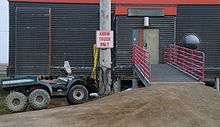KBRW (AM)
 | |
| City | Barrow, Alaska |
|---|---|
| Broadcast area | Alaska Bush |
| Branding | KBRW-AM |
| Slogan | Top of the World Radio |
| Frequency | 680 kHz (AM) |
| Format | Public radio |
| Power | 10,000 watts |
| Class | A |
| Facility ID | 60375 |
| Callsign meaning | BaRroW |
| Owner | Silakkuagvik Communications |
| Sister stations | KBRW-FM |
| Webcast | |
| Website | www.kbrw.org |
KBRW is a non-commercial radio station in Barrow, Alaska, broadcasting on 680 kHz with 10,000 watts of power from a non-directional antenna. KBRW is a Class A station broadcasting on the clear-channel frequency of 680 AM. The station airs public radio programming from the National Public Radio and Native Voice One networks. KBRW also airs some locally originated programming, as well as native affairs, popular music and religious programs.
Licensee Silakkuagvik Communications also operates KBRW-FM at 91.9 FM, which airs a different programming schedule from this station.

The KBRW broadcast stream on the Internet (www.kbrw.org and www.kbrwradio.org) is believed to be the northernmost source for broadcast streaming audio on Earth.
Earl Finkler, a longtime station staffer, became known beyond Barrow as an interviewer and commentator. His commentaries were aired on multiple public radio networks, and also appeared in the Arctic Sounder newspaper. He remains well known for his association with KBRW even after retiring to his home state of Wisconsin.
As early as 1979, KBRW was the northernmost affiliate of the weekly chart show, American Top 40 with Casey Kasem, which is no longer heard on KBRW.[1]
Translators
| Call sign | Frequency (MHz) | City of license | ERP W | Class | FCC info |
|---|---|---|---|---|---|
| K201AG | 88.1 | Nuiqsut, Alaska | 200 | D | FCC |
| K201AH | 88.1 | Kaktovik, Alaska | 39 | D | FCC |
| K201AV | 88.1 | Point Lay, Alaska | 48 | D | FCC |
| K268AA | 101.5 | Point Hope, Alaska | 17 | D | FCC |
| K268AB | 101.5 | Anaktuvuk Pass, Alaska | 18 | D | FCC |
History
The station began broadcasting in 1976 on 680 AM with 1,000 watts. Smaller FM signals were added in 1988. The AM signal was upgraded to 10,000 watts in 1996. Shortly after the upgrade, a fire took the station off the air for several weeks. Thanks to the FM transmitters, broadcasting continued near the villages, while a new transmitter was installed to serve the outlying areas.[2]
References
- ↑ American Top 40 with Casey Kasem: The 1970s, by Pete Battistini (p.273). Bloomington, Indiana: Author House, 2004.
- ↑ http://www.redwaveradio.com/11_802423fbd0179725_1.htm
External links
- Query the FCC's AM station database for KBRW
- Radio-Locator Information on KBRW
- Query Nielsen Audio's AM station database for KBRW
Coordinates: 71°15′24″N 156°31′32″W / 71.25667°N 156.52556°W